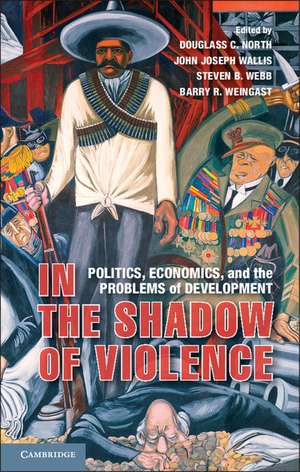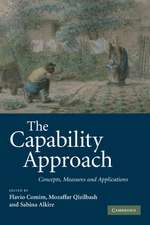In the Shadow of Violence: Politics, Economics, and the Problems of Development
Editat de Douglass C. North, John Joseph Wallis, Steven B. Webb, Barry R. Weingasten Limba Engleză Paperback – 11 noi 2012
Preț: 327.41 lei
Nou
Puncte Express: 491
Preț estimativ în valută:
62.65€ • 65.41$ • 51.85£
62.65€ • 65.41$ • 51.85£
Carte tipărită la comandă
Livrare economică 04-18 aprilie
Preluare comenzi: 021 569.72.76
Specificații
ISBN-13: 9781107684911
ISBN-10: 1107684919
Pagini: 378
Ilustrații: 12 b/w illus. 2 maps 42 tables
Dimensiuni: 152 x 226 x 25 mm
Greutate: 0.5 kg
Ediția:New.
Editura: Cambridge University Press
Colecția Cambridge University Press
Locul publicării:New York, United States
ISBN-10: 1107684919
Pagini: 378
Ilustrații: 12 b/w illus. 2 maps 42 tables
Dimensiuni: 152 x 226 x 25 mm
Greutate: 0.5 kg
Ediția:New.
Editura: Cambridge University Press
Colecția Cambridge University Press
Locul publicării:New York, United States
Cuprins
1. Limited access orders: an introduction to the conceptual framework Douglass C. North, John Joseph Wallis, Steven B. Webb and Barry R. Weingast; 2. Bangladesh: economic growth in a vulnerable LAO Mushtaq H. Khan; 3. Fragile states, elites, and rents in the Democratic Republic of Congo (DRC) Kai Kaiser and Stephanie Wolters; 4. Seeking the elusive developmental knife-edge: Zambia and Mozambique – a tale of two countries Brian Levy; 5. Limited access orders: the Philippines Gabriella R. Montinola; 6. India's vulnerable maturity: experiences of Maharashtra and West Bengal Pallavi Roy; 7. Entrenched insiders: limited access order in Mexico Alberto Diaz-Cayeros; 8. From limited access to open access order in Chile, take two Patricio Navia; 9. Transition from a limited access order to an open access order: the case of South Korea Jong-Sung You; 10. Lessons: in the shadow of violence Douglass North, John Wallis, Steven Webb and Barry Weingast.
Recenzii
'This book is a welcomed and outstanding companion to Violence and Social Orders by North, Wallis, and Weingast. The editors apply the earlier framework to numerous countries and draw lessons from which we gain considerable insights into modern development.' Lee J. Alston, University of Colorado
'The rigorous analyses of In the Shadow of Violence empirically demonstrate the explanatory power of the theory advanced by North, Wallis, and Weingast in Violence and Social Orders, corroborating their novel understanding of economic underdevelopment as a violence-reducing equilibrium.' Benito Arruñada, University Pompeu Fabra, Spain
'In In the Shadow of Violence, eight knowledgeable specialists address the politics and economics of eight key countries in the developing world. They explore as well what North, Wallis, and Weingast call the logic of 'limited access', wherein, it is held, political order comes at the expense of sustained economic growth. Using case materials, they evaluate this claim and teach us much about the political economy of development.' Robert Bates, Harvard University
'The essays in this provocative volume, written by analytically attuned area experts, give flesh and bones to the theoretical perspective on 'limited access orders' developed in Violence and Social Orders. The studies show how the World Bank's attempts to transform countries into 'open access orders' typically yield more violence than development. The well-acclaimed editors offer an alternative approach to development policy - working within 'limited access orders' in order to improve people's livelihoods.' David D. Laitin, Stanford University
'Through the insightful, well-documented case studies in this volume, we discover that control of violence is central to the experiences of the least and most successful developing countries of the last 50 years. The lesson from their experiences is as compelling as it is unpalatable: success - peace - may depend on allowing elites to retain large rents and supporting organizations that make it easier for elites to collude. This book is necessary reading for development professionals and political economy scholars alike.' Philip Keefer, The World Bank
'North, Wallis, and Weingast come down to earth to apply their ideas to the details of poor countries' problems and institutions. Finally we are headed in the right direction. I hope Jim Kim buys everyone at the World Bank a copy; it won't leave my desk for years.' James Robinson, Harvard University
'The rigorous analyses of In the Shadow of Violence empirically demonstrate the explanatory power of the theory advanced by North, Wallis, and Weingast in Violence and Social Orders, corroborating their novel understanding of economic underdevelopment as a violence-reducing equilibrium.' Benito Arruñada, University Pompeu Fabra, Spain
'In In the Shadow of Violence, eight knowledgeable specialists address the politics and economics of eight key countries in the developing world. They explore as well what North, Wallis, and Weingast call the logic of 'limited access', wherein, it is held, political order comes at the expense of sustained economic growth. Using case materials, they evaluate this claim and teach us much about the political economy of development.' Robert Bates, Harvard University
'The essays in this provocative volume, written by analytically attuned area experts, give flesh and bones to the theoretical perspective on 'limited access orders' developed in Violence and Social Orders. The studies show how the World Bank's attempts to transform countries into 'open access orders' typically yield more violence than development. The well-acclaimed editors offer an alternative approach to development policy - working within 'limited access orders' in order to improve people's livelihoods.' David D. Laitin, Stanford University
'Through the insightful, well-documented case studies in this volume, we discover that control of violence is central to the experiences of the least and most successful developing countries of the last 50 years. The lesson from their experiences is as compelling as it is unpalatable: success - peace - may depend on allowing elites to retain large rents and supporting organizations that make it easier for elites to collude. This book is necessary reading for development professionals and political economy scholars alike.' Philip Keefer, The World Bank
'North, Wallis, and Weingast come down to earth to apply their ideas to the details of poor countries' problems and institutions. Finally we are headed in the right direction. I hope Jim Kim buys everyone at the World Bank a copy; it won't leave my desk for years.' James Robinson, Harvard University
Descriere
This book explains how political control of economic privileges is used to limit violence and coordinate coalitions of powerful organizations.



















